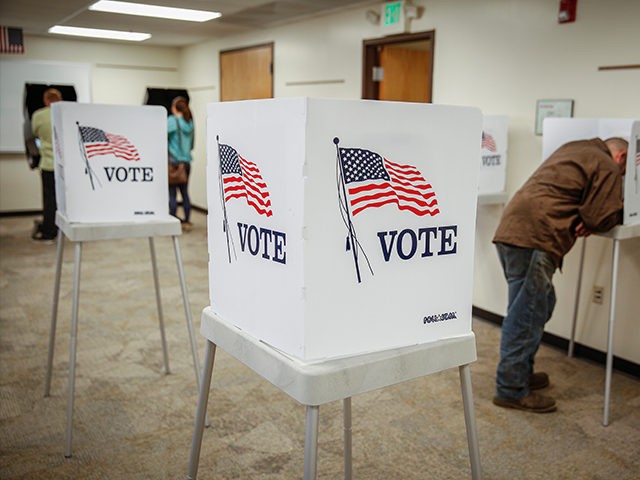The Texas voter ID “fix” instituted before the November presidential election, which allowed citizens without proper documentation to sign a sworn affidavit indicating why they could not procure one in time, now leaves local election officials considering whether “hundreds” of voters should be referred to prosecutors for abusing the safety net.
The election clerk of the largest county in Texas, Harris County Clerk Stan Stanart told Breitbart Texas, “The solution that the court put into place was not a very good solution. It did not allow my office to challenge voters who were obviously taking advantage of the court’s ruling.”
Texas election officials are now acknowledging that hundreds improperly cast ballots in the 2016 Election by signing a sworn statement instead of showing a photo ID, reported the Associated Press on Sunday. The AP estimated that looking at the largest counties in Texas and approximately 13,500 affidavits submitted, at least 500 voters were allowed to vote without an ID “despite indicating they possessed one.”
The AP reported that one of these affidavits stated, “Did not want to ‘pander’ to government requirement.” Another bore a notation by the election judge which stated, “Had photo ID but refused to show it.” More than 15 percent of voters in Fort Bend County near Houston who submitted affidavits stated they had photo IDs. Judge Ramos’ ruling explicitly prevented election workers from asking a voter why they wanted to use an affidavit.
“Questionable affidavits” from the November presidential election were identified in more than 20 Texas counties. Bexar County Election Administrator Jacquelyn Callanen estimated that a large portion of the 600 affidavits should have been declined, the AP investigation showed.
Given that the improperly cast ballots cannot be reversed following certification of election results, officials and policymakers are left to consider options for reform. One former Justice Department attorney and election law expert notes that Texas should consider retooling the process, but not losing the “safety net” altogether.
“A voter ID ‘safety net’ like in Texas and Wisconsin in 2016 was a valid option to ameliorate hardships some might have otherwise seen. However, it is within Texas’ right to improve this process by allowing only verifiable excuses be given when signing these documents,” J. Christian Adams, president and general counsel for the Public Interest Legal Foundation told Breitbart Texas. “Lawmakers can also design a uniform audit process to better help those in genuine need of voting assistance and expose others willing to flaunt the law,” he said.
Adams warns that letting the issue slide will only encourage future, alleged abuse of the court’s fix, should it continue to be utilized.
“If Austin punts on strengthening the affidavit process, it will only engender a new breed of illegal behavior and leave local officials vulnerable to partisan lawsuits brought for the sole purpose of chilling actions like Tarrant County and others are reportedly considering,” Adams added.
As reported by Breitbart Texas in October 2014, federal Judge Nelva Gonzalez Ramos, an Obama appointee, issued a permanent injunction requiring Texas to return to enforcing the in-person voter identification requirements that existed before the voter photo ID law was initially enforced in 2013.
Judge Ramos held that the Texas law violated the Voting Rights Act of 1965 because it had: an impermissible discriminatory effect, including deliberate discrimination against blacks and Hispanics; violated the Equal Protection Clause; and unconstitutionally offended voting rights guaranteed under the Fifteenth Amendment. Ramos also ruled that the voter photo ID law was an unconstitutional poll tax prohibited by the Twenty-Fourth Amendment because the law previously provided for a fee for issuing copies of birth certificates or other information needed to obtain an acceptable ID.
In July 2016, the U.S. Court of Appeals for the Fifth Circuit sitting en banc found that Texas’ voter ID law had a discriminatory effect under the Voting Rights Act but reversed Judge Ramos’ finding of discriminatory intent, as reported by Breitbart Texas. The 9-6 ruling held that the law did not constitute a poll tax but ruled that the lower court must put an “interim remedy” in place to mitigate the “discriminatory effects” in time for the 2016 presidential election. The Fifth Circuit warned that the district judge should “ensure that any remedy acted ameliorates SB 14’s discriminatory effect while respecting the Legislature’s stated objective to safeguard the integrity of elections by requiring more secure forms of voter identification.” The appellate court remanded the case to the district court to later determine if the voter ID provisions were written to be intentionally discriminatory.
Breitbart Texas reported in early February that Texas Attorney General Ken Paxton and the Tarrant County District Attorney’s Office prosecuted a Mexican national under its “Illegal Voting” statute. A jury sentenced the woman to eight years in prison. The indictment stated that she voted in the November 2012 general election and the May 2014 primary run-off knowing she was not eligible to vote because she is not a U.S. citizen. Ortega had previously applied to vote but Tarrant County officials rejected her application because she admitted she was not a citizen on the form. She filled out an application five months later and alleged she was a citizen.
Lana Shadwick is a writer and legal analyst for Breitbart Texas. She has served as a prosecutor and associate judge in Texas. Follow her on Twitter @LanaShadwick2.

COMMENTS
Please let us know if you're having issues with commenting.